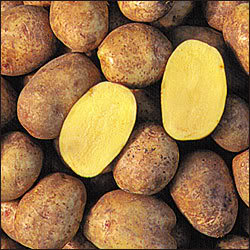Quick links
Yukon Gold
DCHP-2 (Mar 2014)
Spelling variants:Yukon gold
n. — Food
a variety of potato with yellowish skin and flesh (see Image 1).
Type: 1. Origin — The Yukon Gold potato was bred in 1966 by Gary R. Johnston, who also developed several other varieties during his time with the potato breeding programme at the University of Guelph (see the 1999 quotation). The Yukon Gold is the result of a cross between Norgleam and W5279-4 potatoes, and was registered in Canada in 1980. This variety of potato is now widely grown. See also CFIA resource.
See also COD-2, s.v. "Yukon Gold".
See also COD-2, s.v. "Yukon Gold".
Johnston named the potato "Yukon" initially, but decided to add "Gold" to make it more memorable. See also the 1999 quotation.
Quotations
1988
If all this doesn't get your gastric juices flowing, consider Canada's own recently developed Yukon Gold potato. With yellowish-buff skin and pink eyes (mmmm, good!), the Yukon Gold is good for boiling or baking, Agriculture Canada reports.
1989
The once-lowly potato has come a long way. According to Agriculture Canada, customers who are "looking for something more" can now buy potatoes that come in a veritable kaleidoscope of colors - white, yellow, red and purple.
The designer spuds, which bear names like Yukon Gold, Purple Chief and Red Pontiac, are aimed at making gourmets take a second look at a vegetable that has traditionally been considered dull.
1999
Johnston, an 83-year-old Guelph man, is a retired food scientist who has given us the better potato - namely the Yukon Gold, which is commonly found in Canadian supermarkets.
The only thing he got for his troubles is the honour of being the breeder of a successful new potato, because when the Yukon Gold came on the scene in 1980 there was no such thing as breeder royalties.
"The university would have made a small fortune," said Johnston, who led the potato breeding programme at the University of Guelph from the 1950s to the early 1990s.
"It (Yukon Gold) is grown all over the world."
Although a Canadian spud, the Yukon Gold potato was claimed by the first lady of the United States several years ago, to the amusement of U.S. media and Johnston, who chuckles when he tells the story.
Hillary Clinton was hosting a dinner said to be made up of items grown or produced exclusively in the States. Yukon Gold was on the table.
"That was kind of amusing," Johnston said. "She thought Yukon Gold came from Alaska." [...] Working from a university research site known at the time as the Cambridge Potato Farm, Johnston crossed a North Dakota white potato and a wild yellow potato about the size of a walnut from South America. The wild variety brought a nutty taste to Yukon Gold.
Johnston made the cross in 1966, but it would be 14 years of growing and testing before it was released in 1980.
Johnston has found that the the name Yukon Gold is a name that sticks in people's minds and has actually been helpful to the potato's success.
"I came up with the name Yukon, and someone else said 'why not put Gold on the end'?" said Johnston. "The name really went."
[...] While Yukon Gold is the best known and best eaten of his varieties, there are about 16 potatoes bred by Johnston and then registered for growing in Canada.
2005
Smoky roasted red peppers ($10.95) are stuffed with pine nuts and the creamiest of goat cheeses atop a summery tomato coulis. Side vegetables - a fluffy mash of sweet and Yukon gold potatoes, the crumpled rapini, crisp-tender broccoli - get respect.
2014
One of the most surprising things students discovered as they delved into the history of the University of Guelph is how broad and vast its research has contributed to local and global innovation over its 50-year history.
The university offered a museum project course over the last three semesters, and students created an exhibit that was launched Saturday at the Guelph Civic Museum. It runs until mid-July. [...] The exhibit highlights research projects like Robo-gut, the development of the Yukon Gold potato and other food innovations, zoonotics, the Barcode of Life project, the Honeybee Research Centre, bio-economy innovations, water and groundwater research, and archive and special collections.
References
- COD-2
- CFIA • "Yukon Gold"
Images
